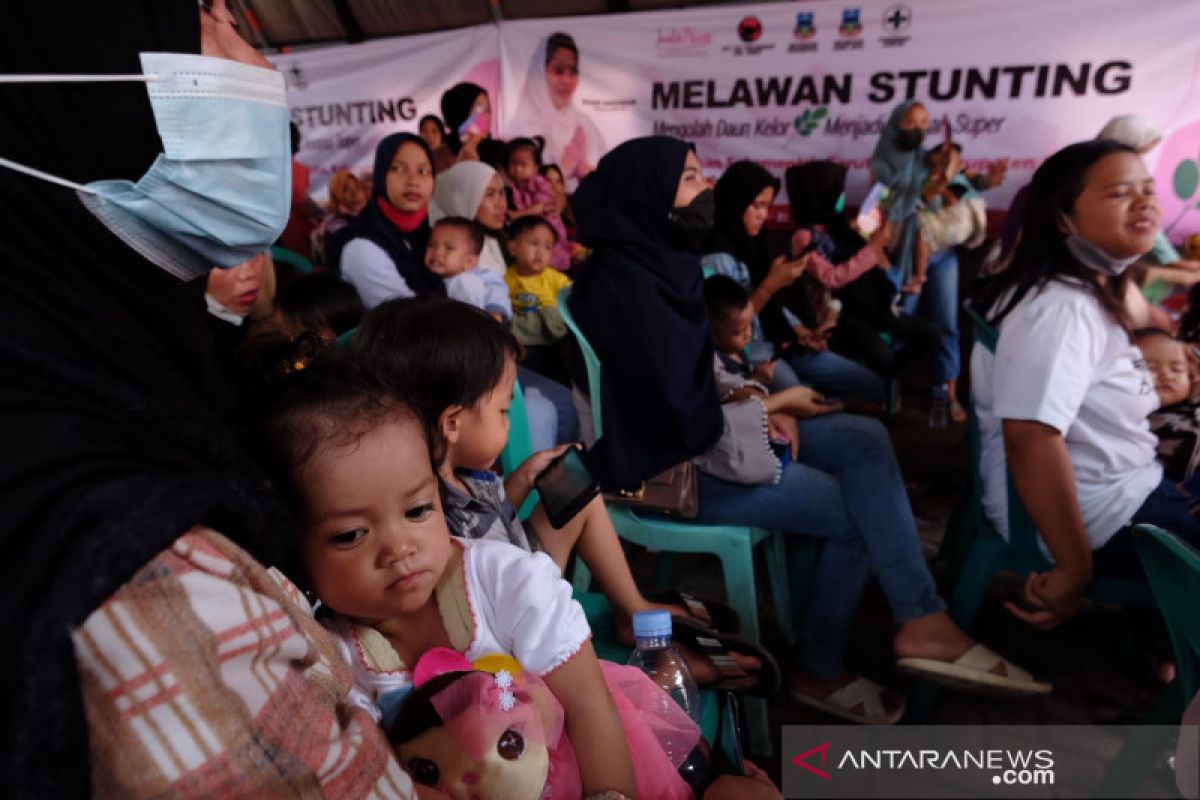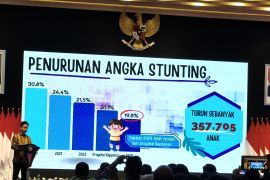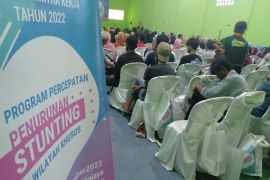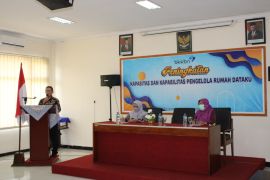This seems reasonable considering that up until now, there has been no single formula in the world that has been effectively recognized as a solution to the pandemic problem, other than the implementation of health protocols, the 3Ts (testing, tracing, treatment), and vaccinations, which are still being developed today.
However, there are several other problems that existed before the COVID-19 pandemic that should also be a cause for concern for everyone, in particular, stunting and malnutrition, which are threatening the quality of Indonesia's human resources.
Stunting is a nutritional deficiency that affects infants during the first 1,000 days of life and lasts a long time. It causes delays in brain development and child development.
Due to chronic malnutrition, stunted children are shorter compared to toddlers their age.
Related news: BKKBN invites college students to support stunting-reduction efforts
In the two years of President Joko Widodo and Vice President Ma'ruf Amin's administration, attention has been mostly focused on the issue of handling the COVID-19 pandemic. For that reason, President Widodo (Jokowi) has implemented two steps to lower the rate of child stunting in Indonesia to 14 percent by 2024.
First, he has assigned the National Population and Family Planning Agency (BKKBN) the task of leading the stunting reduction program.
Second, his government has decided to focus the stunting reduction program on ten provinces that have the highest prevalence rates in Indonesia.
The 10 provinces are East Nusa Tenggara (NTT), West Sulawesi, West Nusa Tenggara (NTB), Gorontalo, Nanggroe Aceh Darussalam, Central Kalimantan, South Kalimantan, West Kalimantan, Southeast Sulawesi, and Central Sulawesi.
Related news: Focusing on alleviating poverty, child stunting reduction: ministry
Important issue
In Indonesia, the problem of stunting remains an important issue to be resolved because it is considered to have the potential to disrupt the potential of human resources and is related to health, even child mortality.
The Indonesian Toddler Nutrition Status Survey (SSGBI) has shown that there was a decline in the stunting rate to 27.67 percent in 2019.
Even though the stunting rate in Indonesia fell, that figure was still considered high according to the standards set by the WHO, which requires the stunting rate to be no more than 20 percent.
Data from the World Bank shows that 54 percent of the workforce suffered from stunting in their childhood. For that reason, the problem of stunting is a serious concern for the government.
Related news: COVID-19 pandemic becomes challenge to reduce child stunting: VP
To follow up on the success of stunting handling, with the stunting rate successfully reduced to 27.67 percent in 2019 from 37 percent in 2016, the government is now taking stunting reduction seriously.
Many believe that stunting reduction efforts in the country will succeed if all parties, including the central government, private sector, and regional heads, continue to support them.
The central government must therefore continue to encourage governors, district heads, and mayors, as well as village heads in the ten provinces to focus on efforts to reduce stunting rates as a shared responsibility.
The government does have a new strategy to achieve the stunting rate target set by the President, which is to achieve a reduction of 2.5 percent per year.
The strategy includes updating stunting data which is essential to start the stunting reduction program and achieve the target by 2024.
In addition, the involvement of many other parties is also essential for the stunting reduction program in the country.
For example, the private sector and political parties in remote areas need to be involved in efforts to reduce stunting cases in regions along with the implementation of massive COVID-19 vaccinations.
Related news: Local governments should remap child stunting reduction program: VP
Importance of collaboration
Several parties have shown their commitment to collaborating with the government for eradicating stunting in the country.
In various regions, such collaborations have been realized; for example, in Garut, West Java, police and political parties have been involved in stunting reduction.
Garut Police chief Adjunct Senior Commissioner Wirdhanto Hadicaksono, S.I.K., has said that police has collaborated with the Indonesian Democratic Party-Struggle (PDIP) of Garut district, the government of Garut Kota subdistrict, and HaloPuan to organize vaccinations for three thousand residents spread across four villages in the Garut Kota subdistrict, as well as to launch the 'Movement Against Stunting' program.
The movement is focused on stunting reduction in Sukamentri village, Garut Kota subdistrict, where stunting prevalence, recorded at 22.03 percent, is above the national average.
A member of the Garut Provincial Legislative Council (DPRD) said that DPRD has affirmed that the handling of the stunting problem should not be downplayed and must remain a priority along with efforts to overcome the COVID-19 pandemic.
He said he believes that the problem of stunting can be resolved in the midst of the pandemic only through the collaboration of all parties.
The program involving HaloPuan and the local Health Office is disseminating the negative impacts of stunting to the public, he informed.
Related news: Pandemic increasing prevalence of stunting: BKKBN
As part of the program, the public is also being advised to consume Moringa leaves, which are considered highly nutritious and can be easily found in the country, as alternative nutritious supplementary food because of their rich micronutrient content, he said.
Under the program, packages of Moringa leaf powder have been provided to about 150 toddlers and pregnant women from Sukamentri village, he added.
The Indonesian government is striving to reduce cases of stunting to 14 percent by 2024, he said.
Earlier, BKKBN Head Hasto Wardoyo had said the agency will implement the National Action Plan to accelerate the reduction in cases of stunting through an approach centered on at-risk families.
The approach encompasses providing data on families at risk of stunting, assisting at-risk families, assisting prospective brides or prospective couples of childbearing age, surveilling families at risk of stunting, and auditing stunting cases.
Related news: Aceh study center to boost disaster literacy: National Library
Related news: COVID vaccination coverage reaches 65.25% in Medan, N Sumatra
Editor: Fardah Assegaf
Copyright © ANTARA 2021












